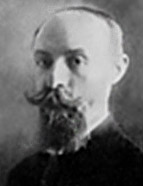

Georges Le Gentil was the only child of a justice of the peace and a dressmaker, both Catholics. He was born in the department of Marne, some two hundred kilometres east of Paris, at the beginning of the Third Republic. He completed his secondary education at the Lycée de Reims, in the capital of Champagne, and passed the competitive examination for the Agrégation de lettres, which in France gives access to the profession of secondary school teacher, in 1901. He then obtained a scholarship to study in Spain between 1901 and 1902. As an official in the Ministry of Public Instruction and Fine Arts, he was appointed professor of classical literature at various secondary schools throughout the country. He taught at the Lycée de Tourcoing (North) between 1902 and 1904, and then at secondary schools in Cahors, Montauban and Toulouse, in south-western France. He obtained a doctoral scholarship from the University of Toulouse (1907-1908), where he received his doctorate in literature in 1909. At that time, Georges Le Gentil was training as a specialist in Hispanic studies: his doctoral thesis dealt with literary journals in Spain in the first half of the 19 th century and the poetic work of Manuel Bretón de los Herreros.
In 1914, he was called up to serve as a soldier in the First World War. For two years, he fought on the front line in Alsace, which had been annexed by the German Empire in 1870. Between July 1916 and March 1919, the French army entrusted him with the mission of recruiting labour in Portugal to compensate for the shortage of workers in French industry. This stay of almost three years in Portugal was the initiative of Mário Roques (1875-1961), a French university professor of Peruvian origin who taught at the Sorbonne. This can be considered the key moment in the conversion of the Hispanist Georges Le Gentil to Portuguese-language cultures and literature. However, it should be remembered that he had already published articles on Portuguese subjects on two occasions in the journal Le Bulletin hispanique. In 1912, he wrote a critical review of the work of Alexandre Herculano and his legacy in Portugal, in the context of the centenary of his birth. It is known that this long stay in Portugal allowed him to acquire a remarkable knowledge of both the Portuguese language and culture, whether from the elites he frequented at the time or from the more humble “people” with whom he lived during his military mission. As Marcel Bataillon, his student and author of the obituary published in the Bulletin hispanique in 1954, put it: “Le pays qu’il parcourut alors en tous sens, et dont il apprit à connaître les humbles, le passionna et le conquit” (Marcel Bataillon, “Nécrologie”. Bulletin hispanique , Paris, 1954, vol. LVI, no. 1-2, p. 6).
This work is financed by national funds through FCT - Foundation for Science and Technology, I.P, in the scope of the projects UIDB/04311/2020 and UIDP/04311/2020.
